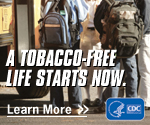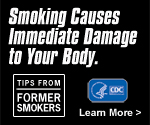Smoking Cessation
Overview
Tobacco use can lead to nicotine dependence and serious health problems. Cessation can significantly reduce the risk of suffering from smoking-related diseases. Tobacco dependence is a chronic condition that often requires repeated interventions, but effective treatments and helpful resources exist. Smokers can and do quit smoking. In fact, today there are more former smokers than current smokers.1
Nicotine Dependence
- Nicotine is the psychoactive drug in tobacco products that produces dependence.2–5 Most smokers are dependent on nicotine.2,3
- Nicotine dependence is the most common form of chemical dependence in the United States.6 Research suggests that nicotine may be as addictive as heroin, cocaine, or alcohol.3,5
- Quitting smoking is difficult and may require multiple attempts.3,4 Users often relapse because of stress, weight gain, and withdrawal symptoms.2,3,4
- Examples of nicotine withdrawal symptoms include irritability, anxiety, difficulty concentrating, and increased appetite.1,2,3
Health Benefits of Cessation
Breaking free from nicotine dependence is not the only reason to quit smoking. Cigarette smoke contains a deadly mix of more than 7,000 chemicals; hundreds are toxic and about 70 can cause cancer.3,7 Cigarette smoke can cause serious health problems, numerous diseases, and death.3
Fortunately, people who stop smoking greatly reduce their risk for disease and premature death. Although the health benefits are greater for people who stop at earlier ages, cessation is beneficial at all ages.3,8,9
Smoking cessation is associated with the following health benefits:3,8,9
- Smoking cessation lowers the risk for lung and other types of cancer.
- Smoking cessation reduces the risk for coronary heart disease, stroke, and peripheral vascular disease. Coronary heart disease risk is substantially reduced within 1 to 2 years of cessation.
- Smoking cessation reduces respiratory symptoms, such as coughing, wheezing, and shortness of breath. The rate of decline in lung function is slower among persons who quit smoking.
- Smoking cessation reduces the risk of developing chronic obstructive pulmonary disease (COPD), one of the leading causes of death in the United States.
- Smoking cessation by women during their reproductive years reduces the risk for infertility. Women who stop smoking during pregnancy also reduce their risk of having a low birth weight baby.
Smokers' Attempts to Quit
Among current U.S. adult smokers, 68.8% report that they want to quit completely, and millions have attempted to quit smoking.1 Starting in 2002, the number of former smokers has exceeded the number of current smokers.1
Percentage of adult smokers who stopped smoking for more than 1 day in 2010 because they were trying to quit:
- 52.4% of all adult smokers (23.7 million people)1,10
- 62.4% of smokers aged 18–24 years1
- 56.9% of smokers aged 25–44 years1
- 45.5% of smokers aged 45–64 years1
- 43.5% of smokers aged 65 years or older1
Percentage of high school smokers who stopped smoking for more than 1 day in 2009 because they were trying to quit:
- 50.8% of all high school students who smoke11
Methods to Quit Smoking
The majority of cigarette smokers quit without using evidence-based cessation treatments.1 However, the following treatments are proven effective for smokers who want help to quit:2
- Brief clinical interventions (i.e., when a doctor takes 10 minutes or less to deliver advice and assistance about quitting)
- Counseling (e.g., individual, group, or telephone counseling)
- Behavioral cessation therapies (e.g., training in problem solving)
- Treatments with more person-to-person contact and intensity (e.g., more time with counselors)
Cessation medications found to be effective for treating tobacco dependence include the following:
- Nicotine replacement products1
- Over-the-counter (e.g., nicotine patch, gum, lozenge)
- Prescription (e.g., nicotine inhaler, nasal spray)
- Prescription non-nicotine medications, such as bupropion SR (Zyban®)2 and varenicline tartrate (Chantix®).2,12
The combination of medication and counseling is more effective for smoking cessation than either medication or counseling alone.2
Helpful Resources
Publications
The following CDC publications are helpful cessation resources for public health practitioners, businesses, and organizations. Visit CDC's online publications catalog to order free copies of these and other cessation-related materials:
- A Practical Guide to Working with Health-Care Systems on Tobacco-Use Treatment
- Youth Tobacco Cessation—A Guide for Making Informed Decisions
- Telephone Quitlines: A Resource for Development, Implementation, and Evaluation
Quitline Services
1-800-QUIT-NOW  is a free telephone support service that can help individuals who want to stop smoking or using tobacco. Callers have access to several types of cessation information and services, including:
is a free telephone support service that can help individuals who want to stop smoking or using tobacco. Callers have access to several types of cessation information and services, including:
- Free support and advice from experienced counselors
- A personalized quit plan
- Self-help materials
- Social support and coping strategies
- The latest information about cessation medications
- Over-the-counter nicotine replacement medications for eligible participants (in more than half of U.S. states)
Cessation Services
- CDC's How to Quit Web pages provide a variety of cessation tips, tools, and resources.
- Smokefree.gov
 is a Web site dedicated to helping smokers quit.
is a Web site dedicated to helping smokers quit.
References
- Centers for Disease Control and Prevention. Quitting Smoking Among Adults—United States, 2001–2010. Morbidity and Mortality Weekly Report [serial online] 2011;60(44):1513–19 [accessed 2011 Nov 10].
- Fiore MC, Jaén CR, Baker TB, Bailey WC, Benowitz NL, Curry SJ, Dorfman SF, Froelicher ES, Goldstein MG, Froelicher ES, Healton CG, et al.
Treating Tobacco Use and Dependence: 2008 Update—Clinical Practice Guidelines
 . Rockville (MD): U.S. Department of Health and Human Services, Public Health Service, Agency for Healthcare Research and Quality, 2008 [accessed 2011 Nov 7].
. Rockville (MD): U.S. Department of Health and Human Services, Public Health Service, Agency for Healthcare Research and Quality, 2008 [accessed 2011 Nov 7]. - U.S. Department of Health and Human Services. How Tobacco Smoke Causes Disease: The Biology and Behavioral Basis for Smoking-Attributable Disease: A Report of the Surgeon General. Atlanta: U.S. Department of Health and Human Services, Centers for Disease Control and Prevention, National Center for Chronic Disease Prevention and Health Promotion, Office on Smoking and Health, 2010 [accessed 2011 Nov 7].
- U.S. Department of Health and Human Services. Reducing Tobacco Use: A Report of the Surgeon General. Atlanta: U.S. Department of Health and Human Services, Centers for Disease Control and Prevention, National Center for Chronic Disease Prevention and Health Promotion, Office on Smoking and Health, 2000 [accessed 2011 Nov 7].
- National Institute on Drug Abuse. Research Report Series: Tobacco Addiction
 . Bethesda (MD): National Institutes of Health, National Institute on Drug Abuse, 2009 [accessed 2011 Nov 7].
. Bethesda (MD): National Institutes of Health, National Institute on Drug Abuse, 2009 [accessed 2011 Nov 7]. - American Society of Addiction Medicine.
Public Policy Statement on Nicotine Dependence and Tobacco
 (PDF–92 KB). Chevy Chase (MD): American Society of Addiction Medicine, 2010 [accessed 2011 Nov 7].
(PDF–92 KB). Chevy Chase (MD): American Society of Addiction Medicine, 2010 [accessed 2011 Nov 7]. - National Toxicology Program. Report on Carcinogens, Twelfth Edition
 (PDF–5.53 MB). Research Triangle Park (NC): U.S. Department of Health and Human Sciences, National Institute of Environmental Health Sciences, National Toxicology Program, 2011 [accessed 2011 Nov 7].
(PDF–5.53 MB). Research Triangle Park (NC): U.S. Department of Health and Human Sciences, National Institute of Environmental Health Sciences, National Toxicology Program, 2011 [accessed 2011 Nov 7]. - U.S. Department of Health and Human Services. The Health Consequences of Smoking: A Report of the Surgeon General. Atlanta: U.S. Department of Health and Human Services, Centers for Disease Control and Prevention, National Center for Chronic Disease Prevention and Health Promotion, Office on Smoking and Health, 2004 [accessed 2011 Nov 7].
- U.S. Department of Health and Human Services.
The Health Benefits of Smoking Cessation: A Report of the Surgeon General
 .
Atlanta: U.S. Department of Health and Human Services, Centers for Disease Control and Prevention, Center for Chronic Disease Prevention and Health Promotion, Office on Smoking and Health, 1990 [accessed 2011 Nov 7].
.
Atlanta: U.S. Department of Health and Human Services, Centers for Disease Control and Prevention, Center for Chronic Disease Prevention and Health Promotion, Office on Smoking and Health, 1990 [accessed 2011 Nov 7]. - Centers for Disease Control and Prevention. Vital Signs: Current Cigarette Smoking Among Adults Aged ≥ 18 Years—United States, 2005–2010. Morbidity and Mortality Weekly Report [serial online] 2011;60(35):1207–12 [accessed 2011 Nov 7].
- Centers for Disease Control and Prevention. Youth Risk Behavior Surveillance—United States, 2009 (PDF–3.51 MB). Morbidity and Mortality Weekly Report [serial online] 2010;59(SS–5) [accessed 2011 Nov 7].
- U.S. Food and Drug Administration
The FDA Approves Novel Medication for Smoking Cessation
 . FDA Consumer, 2006 [accessed 2011 Nov 7].
. FDA Consumer, 2006 [accessed 2011 Nov 7].
For Further Information
Centers for Disease Control and Prevention
National Center for Chronic Disease Prevention and Health Promotion
Office on Smoking and Health
E-mail: tobaccoinfo@cdc.gov
Phone: 1-800-CDC-INFO
Media Inquiries: Contact CDC's Office on Smoking and Health press line at 770-488-5493.
File Formats: All viewers, players, and plug-ins used on this site can be downloaded from the file formats page. (For example: Adobe Acrobat Reader for pdf files, Windows Media Player for audio and video files, PowerPoint Viewer for presentation slides, etc.)
Contact Us:
- CDC/Office on Smoking and Health
4770 Buford Highway
MS K-50
Atlanta, Georgia 30341-3717 - 800-CDC-INFO
(800-232-4636)
TTY: (888) 232-6348
8am–8pm ET
Monday–Friday
Closed Holidays - tobaccoinfo@cdc.gov





